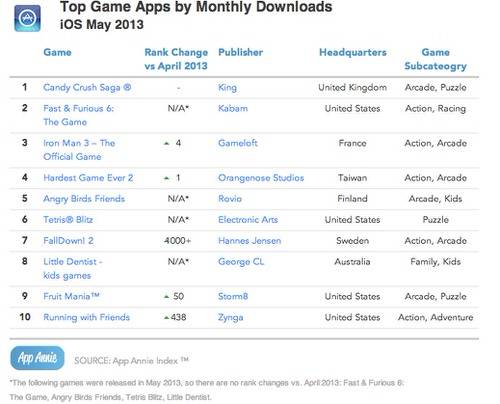
A saga of sweet, sweet proportions has been unfolding on smartphones across the world over the last several months. And a new darling of mobile game publishers may have been born.
Candy Crush Saga, by United Kingdom-based games publisher King.com, is the most downloaded game for both the iPhone and Android. And it has been so for some time. But how did this game, which really has no discernible special features or original style of gameplay, become the overwhelming favorite among mobile gamers?
Mobile analytics firm App Annie, which tracks downloads and revenue on both the Google Play store for Android and Apple’s App Store, has Candy Crush as the most downloaded game for May 2013 in both. Candy Crush also brought in the most revenue of games in the App Store for the month while coming in second (to a game called Puzzle & Dragons from Japan) in Google Play. The top charts within the App Store and Google Play themselves have listed Candy Crush at or near the top for almost all of 2013.
What makes Candy Crush’s success more amazing is that its publisher, King.com, has not historically had success in mobile. Yet, for May 2013, King ranked third in number of downloads on the App Store. It was fourth on Google Play. King was in the top 10 in revenue for the month in both stores as well.
And King accomplished that with only three games in the App Store and two for Android. Electronic Arts has 829 apps in the App Store and 121 on Google Play. Angry Birds maker Rovio has 30 apps for the iPhone/iPad and 15 for Android. According to App Annie, the three publishers ahead of King—EA, Rovio, and Gameloft—on the App Store average 372 apps on the platform.
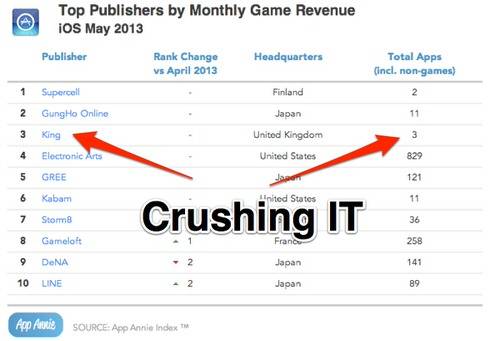
King defies the conventional mobile-game wisdom of spreading your bets as bored consumers go from game to game to game. And Candy Crush reigns supreme.
No Neophyte Ruler
King has been making games on the Internet for 10 years. You’ve likely played a couple in you life in a moment of boredom. King’s catalog of games includes standards like Solitaire and word games. The company’s website says it has more than 150 games in its portfolio, most accessible through desktop browsers and heavily tied to Facebook.
King received backing from Yahoo Europe in 2004 and €34 million from two venture capital firms in 2005. It is reportedly considering an initial public offering which would let it expand further around the globe, particularly in Asia. It’s not some baby company making its first steps. Yet it is relatively new to mobile, which may give a reason as to why Candy Crush Saga does so well. It has pulled off a trick Zynga has largely failed to do, pulling in players from the desktop world who are getting a favorite game on their smartphones for the first time.
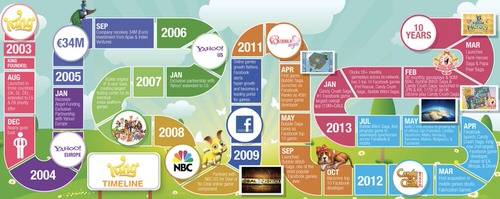
As a game, Candy Crush is remarkable for how unremarkable it is. If you ever played Bejeweled on the desktop or a mobile device, Candy Crush Saga is a lot like that. Instead of jewels, one plays with candy. It uses classic social marketing dynamics to move players along in the game (share information, get friends to sign up, get rewards) and in-app purchases for extra moves and extra lives. These match-style games are nothing new. They started with Tetris in the 1980s and moved to Dr. Mario in the 1990s. The past decade brought bubbles, monsters, jewels … and candy.
Past mobile hits, like Minecraft and Angry Birds, brought genuinely new styles of play or new social dynamics like the ones Zynga popularized. Candy Crush’s in-app purchase options and graphics are standard-issue.
But it turns out that focusing on the traits that seem distinctive when trying to sort through the mass of mobile games doesn’t really help you identify hits.
Striking A Balance
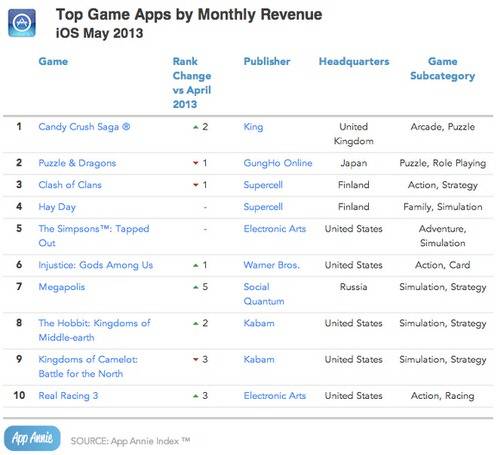
The experts at App Annie don’t have a really good explanation for the popularity of Candy Crush.
“It is a combination of a lot of things and no one thing in particular,” said Marcos Sanchez, VP of corporate global communications at App Annie. “Candy Crush has found a balance between storyline, pace of gameplay and social.”
Puzzle games have almost always done well on computers, from Minesweeper on ancient Windows PCs to Tetris to Candy Crush. Sanchez notes that games like Candy Crush are great time-killers, played while waiting for a bus or on the Subway or in the waiting room at the doctor’s office.
To a certain extent, Candy Crush speaks to the preponderance of smartphones as the primary interface people currently have with the Internet.
“People are really starting to experience the Internet more through mobile apps to the detriment of the desktop browser,” Sanchez said.
So, it is understandable that a classic PC-style puzzle match game would do well in mobile. Today, it is Candy Crush, with its unremarkable yet somehow just-right graphics, pace and storyline, its social features, its hints of the Candy Land board game from yesteryear, its je ne sais quoi. Tomorrow? Hard to tell.
Can King Maintain Its Crown?
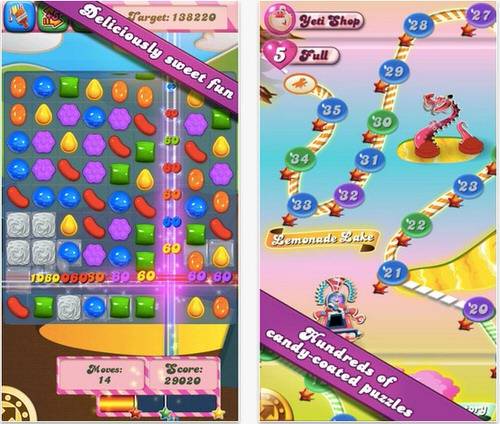
When it comes to the sustainability of business in mobile games, App Annie sees two avenues of success.
“Either you are that cool game that everybody need to have or you are in it through a variety of apps as how you make your money,” Sanchez said.
Angry Birds from Rovio is the classic example of the game you need to have. Electronic Arts and its 829 games in the App Store is the prime example of building a business through a broad portfolio of titles. For the time being, King falls into the former group. But, when Candy Crush Saga inevitably fades, will King have a replacement to help stay at the top of the rankings?
“That’s the golden question,” Sanchez said. “We do tend to notice that the top publishers, especially on iOS, tend to stay the same over time.”
King has a lot of inventory to move from the desktop to mobile. So, there is a chance it can catch fire once again. Will it be Yo-yo Jackpot? Papa Pear? Bubble Witch Saga?
Or, King could be a flash in the pan as the likes of EA and Zynga catch on to its wiles and push it out of the market.
Even if it proves brief, King is experiencing the upside of what has become the golden age for mobile game developers. It should enjoy the success … while it lasts.

















